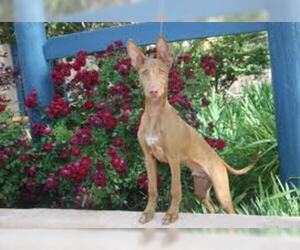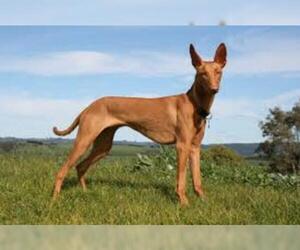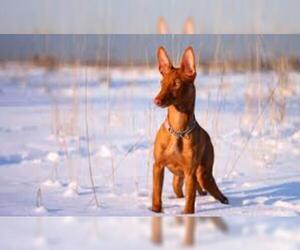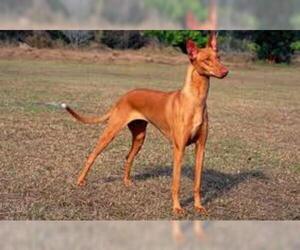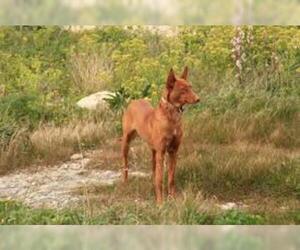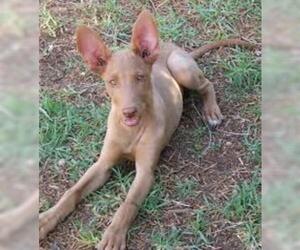
All about Pharaoh Hound dog breed
A.K.A. :Kelb tal-Fenek, Rabbit Dog, Egyptian Hound, Maltese Pharaoh Hound, Maltese Rabbit Hound, Pharaoh Dog, Pharaoh Hound of Malta
Size
Grooming requirements
Exercise requirements
Good with other dogs
Watchdog ability
Energetic
Training requirements
Playful
Affectionate
Good with other pets
Good with children
Good with strangers
Winter
Summer
Healthiness
Protective
Life Span
| Pure Breeds | Member |
| Breeds A - Z | P |
| Breeds by Group | Hound Sighthound & Pariah |
| Breeds by Trait | Fast Dog Breeds High Stamina Dog Breeds Low Shedding |
| Overview: | The Pharaoh Hound is an elegant and ancient breed, originating from Malta where it’s known as Kelb tal-Fenek, though its lineage traces back to ancient Egypt. Physically, they are striking: medium-sized, with a slender yet muscular build, long graceful legs, and large, upright ears that give them an alert expression. Their short, glossy coat comes in various shades of tan or rich russet, often with white markings on the chest, toes, and tail tip. Temperamentally, Pharaoh Hounds are known for being intelligent, playful, and affectionate with their families, but can be reserved with strangers. They possess a strong prey drive and require secure outdoor spaces, making them less suitable for unsupervised apartment living, though they can adapt with sufficient daily exercise. While generally healthy, potential owners should be aware of a predisposition to certain conditions like bloat and sensitivity to anesthesia. Overall, they make wonderful, active companions for families who can provide consistent training and ample opportunity for their energetic spirit to flourish. |
F.A.Q.
All You Need to Know About the Pharaoh Hound Breed
The Pharaoh Hound is an ancient breed, tracing its origins back thousands of years to Egypt, though developed primarily on the island of Malta. Known for their elegant, athletic build and distinctive "blush" when excited, these medium-sized hounds possess a noble yet playful temperament. They are highly intelligent, affectionate with their families, and generally good with children and other pets when properly socialized, making them suitable for active families. While adaptable, their exercise needs are significant; daily vigorous activity, ideally in a securely fenced area, is crucial to prevent boredom and destructive behaviors. Their short, fine coat requires minimal grooming, typically just a weekly brush. Apartment living can be challenging due to their energy levels, but is possible with dedicated exercise. Potential owners should be aware of common health concerns like patellar luxation and certain cancers, though overall, they are a robust breed. Early training and consistent positive reinforcement are key to a well-adjusted Pharaoh Hound.The average healthy weight for an adult Pharaoh Hound typically ranges from 45 to 55 pounds. Males are generally slightly heavier than females, but both sexes fall within this healthy weight range. Prospective owners should look for a Pharaoh Hound weight that is proportionate to its height and build, indicating a healthy weight for Pharaoh Hound.
Curious about the Pharaoh Hound height? These elegant hounds typically stand at an average height of around 24 inches (61 cm) at the shoulder.
For adult Pharaoh Hounds, you can expect a typical height range from 22 to 25 inches (56-63.5 cm). While there isn't a drastic difference, males tend to be slightly taller and more substantial than females. Individual genetics and lineage can also play a role in a Pharaoh Hound's exact height within this range. So, if you're wondering how tall is a Pharaoh Hound, remember this average size gives a great indication of their graceful stature!Pharaoh Hound Colors: A Comprehensive GuideThe striking Pharaoh Hound is primarily known for its rich, fiery coat, with reds being the dominant and most sought-after hues. AKC recognized Pharaoh Hound colors include various shades of red, ranging from a light tan or golden tan to a deep chestnut red. These reds can be solid or feature white markings, which are permissible on the tip of the tail, chest, toes, and a narrow blaze on the face. A full white collar or any white on the shoulders or sides is considered a fault by the AKC.Beyond the standard reds, you'll also encounter fawn Pharaoh Hounds, which present as a paler, more dilute red. While less common, a very light, almost cream coloration can also appear within the breed, often with a reddish tint.Rare coat types and exotic Pharaoh Hound variations are not officially recognized by major kennel clubs like the AKC and are considered highly undesirable, often indicating crossbreeding or genetic mutations that can come with health issues. These unaccepted colors include black, brindle, blue, lilac, merle, and chocolate. Breeders aiming for the breed standard will strictly avoid these colors. Potential adopters or buyers should be wary of breeders advertising Pharaoh Hounds in these non-standard colors, as it may signal a lack of adherence to breed health and purity standards, potentially impacting temperament and long-term health. Stick to the officially recognized reds, tans, and fawns with permissible white markings for a true-to-type Pharaoh Hound.
The Pharaoh Hound personality is a captivating blend of elegance and affection. These intelligent and playful dogs are generally very friendly, eager to please, and highly loyal to their families. While they possess a refined air, they are also quite sociable and enjoy being part of family activities. Pharaoh Hounds adapt remarkably well to apartment living provided they receive adequate exercise, enjoying cozy indoor spaces after a good run. They are known for their gentle nature with children, often forming strong bonds, and typically get along well with other dogs and even cats if introduced properly and raised with them. Their sensitive and somewhat independent temperament of Pharaoh Hound means they thrive on positive reinforcement and consistent, gentle training.
Pharaoh Hound Temperament & Personality TraitsThe Pharaoh Hound temperament is generally described as affectionate, intelligent, and noble. These graceful dogs are known for their lively and playful spirit, making them delightful companion dogs. They are typically friendly and sociable with their families and often warm up to strangers once they've had a proper introduction.Loyalty is a hallmark of the Pharaoh Hound; they form strong bonds with their owners and thrive on being part of the family. While they appreciate comfort, their active nature means they aren't ideal for a purely sedentary lifestyle. Adaptability to apartment living is possible if they receive ample daily exercise, including vigorous runs or playtime. Without sufficient activity, they can become restless.With children, Pharaoh Hounds are generally good-natured and patient, especially when raised with them. Supervision is always recommended, particularly with very young children, to ensure respectful interactions. Regarding other pets, they can coexist peacefully with other dogs, especially if socialized from a young age. Due to their strong sighthound prey drive, careful introductions and supervision are necessary with smaller pets like cats or rabbits.Pharaoh Hounds can exhibit a degree of stubbornness, a common trait in sighthounds, requiring patient and consistent training methods. They are also quite sensitive and respond best to positive reinforcement rather than harsh corrections. Their desire to please, combined with their intelligence, makes them capable of learning a variety of commands and tricks. They are relatively quiet indoors but will alert bark to unusual sounds.
Pharaoh Hound Care: Daily Maintenance & Health TipsPharaoh Hound care is generally straightforward, making them a relatively low-maintenance breed. Their short, fine coat requires minimal grooming needs, typically a weekly brush to remove loose hair and maintain shine. Shedding is moderate.Despite their athletic build, Pharaoh Hounds are a low-energy dog breed indoors. They do, however, require a significant amount of exercise limitations daily, ideally 30-60 minutes of vigorous activity like running, lure coursing, or long walks in a secure, fenced area. Due to their strong prey drive, they should always be leashed outside of secure enclosures.Dietary considerations for Pharaoh Hounds involve a high-quality, balanced diet appropriate for their age and activity level. Monitor their food intake closely for weight management, as they can be prone to gaining weight, which can exacerbate other health issues.Regular dental care is crucial to prevent periodontal disease; brush their teeth several times a week. While not brachycephalic, their ears should be checked weekly for cleanliness and signs of infection. Wrinkle and ear cleaning are minimal but important to prevent skin irritation.Climate sensitivity is a key concern. Pharaoh Hounds have very little body fat and a thin coat, making them highly susceptible to cold. They require coats in chilly weather and should not be left outdoors in cold temperatures. They tolerate heat better but still need shade and fresh water.Common health tips for Pharaoh Hound owners include vigilance for potential skin issues, allergies, and sensitivity to certain medications and anesthesia. Always consult your vet before administering new medications. Regular veterinary check-ups are essential to monitor their overall health and address concerns promptly.
Pharaoh Hound Activity Level: Balanced & Adaptable
The Pharaoh Hound activity level is generally moderate, characterized by a unique blend of explosive energy bursts and prolonged periods of calm rest. These elegant sighthounds require regular, structured exercise but are not hyperactive. Energy Levels & Daily Exercise Needs: Pharaoh Hounds need daily opportunities to run and expend their energy. This typically translates to at least 45-60 minutes of vigorous exercise per day, ideally off-leash in a securely fenced area where they can sprint. They excel at activities like lure coursing, fetch, or long, brisk walks. However, it's crucial to remember that despite their athleticism, they are NOT brachycephalic. This means they do NOT have the same respiratory limitations as true brachycephalic breeds (like Pugs or Bulldogs). Therefore, they can handle more intense exercise in appropriate weather conditions without the same level of risk for overheating or breathing difficulties. They are built for speed and endurance, and their deep chest allows for efficient respiration. Playtime Preferences: Pharaoh Hounds love to chase and retrieve. Interactive games that involve running are their favorites. They also enjoy puzzle toys and mental stimulation to keep their intelligent minds engaged. While they enjoy active play, they are also content to curl up on the sofa for a good nap after their exercise. Are Pharaoh Hounds Suitable for Active Families or Low-Energy Households? Pharaoh Hounds are best suited for moderately active families or individuals who can commit to meeting their daily exercise requirements. While they enjoy lounging, they cannot thrive in a sedentary environment. They are not ideal for extremely low-energy households, as unmet exercise needs can lead to boredom and destructive behaviors. However, they also aren't "always on" like some high-drive working breeds. They perfectly balance their need for speed with their love for comfort and downtime, making them a wonderful companion for those who appreciate their unique exercise rhythm. Understanding how active are Pharaoh Hound is key to a harmonious living situation.Breed Breakdown: What Experts Say About the Pharaoh Hound
I would rate the Pharaoh Hound's "Size" trait as a 7.The Pharaoh Hound is a medium to large-sized dog. While not as massive as a Great Dane or Irish Wolfhound, they are significantly larger and more substantial than a Chihuahua, Pomeranian, or even a Beagle. They typically stand between 21 and 25 inches at the shoulder and weigh between 45 and 55 pounds. Their lean, athletic, and somewhat elongated body structure contributes to an impression of elegant power rather than compact density. Compared to the vast spectrum of companion dogs, they firmly reside in the upper half of the size range.This size generally makes them less ideally suited for very small apartment living unless they receive significant daily exercise outdoors. Their long legs and athletic build mean they appreciate space to stretch out and move around. While they are graceful travelers and can adapt to different environments, households with significant space constraints might find them a bit imposing. They are happiest in homes with a yard or with owners committed to providing ample outdoor activity.
I would rate the Pharaoh Hound's "Grooming Requirements" at a 2 out of 10.Pharaoh Hounds are an exceptionally low-maintenance breed when it comes to grooming. Their short, fine coat sheds minimally and requires little more than an occasional brush to remove loose hairs and maintain a healthy sheen. They don't have undercoats, making shedding easy to manage. Skin fold care is non-existent as they lack significant folds. Ear cleaning is generally infrequent unless the dog has a specific health issue, as their upright ears allow for good air circulation. Nail trimming is standard for any dog, but not more frequent than average. Bathing is only needed when they are visibly dirty, as their coats naturally repel dirt. They are not particularly susceptible to skin issues or allergies compared to many other breeds, further reducing specialized grooming needs. Overall, they are one of the easiest companion dogs to care for in terms of grooming.
I would rate the Pharaoh Hound's "Exercise Requirements" at a 7.Pharaoh Hounds are sighthounds, and as such, possess a strong prey drive and the athletic build to match. They are not a breed content with minimal activity; rather, they thrive on regular, vigorous exercise. While they don't have the "off-the-walls" energy of some working breeds, they do require consistent opportunities to run and expend energy. Daily long walks are a good start, but they truly shine when allowed to gallop in a secure area. They have excellent stamina and can maintain sustained movement, making them good partners for jogging or hiking. Their slender, athletic build means they are well-suited for activities like lure coursing or even amateur agility, which also provides mental stimulation. While not brachycephalic, meaning they don't have the respiratory limitations of breeds like Pugs, their deep chest does make them susceptible to bloat, so exercise should be timed appropriately around meals. They are not a breed that will be content as a couch potato; without adequate exercise, they can become bored, destructive, or even anxious. Structured routines that include opportunities for free running and mental engagement are essential for their physical and mental well-being.
I would rate the Pharaoh Hound's "Watchdog Ability" as a 3 out of 10.While they are certainly alert and will notice when someone new arrives, their response is generally one of curiosity rather than aggression or strong territorial defense. They are not known for excessive barking and are more likely to greet a stranger with a wagging tail than a warning growl. Their territorial instincts are moderate at best, and their primary function as a dog is companionship rather than protection. They might offer a brief "woof" to signal an unfamiliar sound, but this is more of an early notification that something is happening rather than a sustained or deterrent bark. They lack the inherent suspicion and protective drive required for a truly effective watchdog. They are delightful, intelligent companions, but they are far more of a passive presence in terms of home security, unlikely to deter an intruder beyond perhaps a single, curious bark.
I would rate the Pharaoh Hound's "Good with Other Dogs" trait a 7 out of 10.Pharaoh Hounds are generally quite sociable and enjoy the company of other dogs, often thriving in multi-dog households. They typically have a playful and somewhat goofy demeanor that translates well to canine interactions. However, they are sighthounds with a strong prey drive, and while this rarely extends to aggression towards other dogs, it does mean that small, very high-energy dogs might sometimes be perceived differently during play if not carefully managed. They are not typically prone to dominance or aggression with other dogs, preferring to engage in chase games and respectful interaction. Like all breeds, early socialization is crucial to ensure they develop good manners around unfamiliar dogs, but they tend to be naturally amenable. While they are usually adaptable to dogs of various sizes and energy levels, a slow and supervised introduction is always recommended, especially with very boisterous or pushy breeds, to allow their sometimes reserved nature to warm up. They definitely thrive in canine company and generally coexist peacefully.
I cannot provide a rating for the Pharaoh Hound as a brachycephalic breed because the Pharaoh Hound is *not* a brachycephalic breed. They have a long, lean, and athletic build with a distinct, chiseled head and a deep chest, characteristic of sighthounds. Their anatomy is designed for speed and endurance, not for the respiratory challenges associated with brachycephaly.Therefore, ignoring the erroneous brachycephalic assumption, I would rate the Pharaoh Hound's "Energetic" trait as a 7.While not as relentlessly high-energy as some terriers or working breeds, Pharaoh Hounds possess a significant amount of athletic energy and endurance that aligns with their sighthound heritage. They are naturally active and require consistent physical stimulation. They thrive on opportunities to run, chase, and explore, demonstrating bursts of incredible speed and agility. Their playfulness is evident in their desire for interactive games and their often silly, clown-like demeanor around their families. They have excellent stamina and are well-suited for activities like lure coursing, long walks, jogging, or even hiking. However, they are also capable of being relatively laid-back indoors, especially after a good exercise session, enjoying a comfortable spot on the couch. This combination of intense bursts of energy followed by periods of calm makes them a good fit for active individuals or families who can provide adequate outlets for their natural athleticism, but they are certainly not a sedentary breed.
I would rate the Pharaoh Hound's "Training Requirements" at a 7.While intelligent, Pharaoh Hounds possess a significant independent streak and a strong prey drive, making training more challenging than with some other breeds. They can be quite stubborn, and their attention span may wander, especially if they catch sight of something interesting. Responsiveness to commands requires consistent effort and a clear, firm yet gentle hand. Positive reinforcement is highly effective, but treats and praise need to be varied and engaging to hold their interest. They absolutely require consistency and structured routines to understand expectations and prevent them from developing their own, less desirable, habits. This is not a breed I would recommend for a first-time dog owner looking for an easy training experience; they thrive with experienced handlers who understand sighthound temperament and are prepared to invest significant time and patience in training.
I'd rate the Playful trait of the Pharaoh Hound a 7 out of 10.While not as boisterously playful as some other breeds (like a Jack Russell Terrier or a Golden Retriever), the Pharaoh Hound possesses a delightful and often surprising playfulness that emerges once they're comfortable and feel secure. They have a sophisticated, almost cat-like approach to play, enjoying short bursts of intense activity followed by periods of elegant repose. Their playfulness is more nuanced than outright energetic. They adore games, especially those involving chasing and retrieving, and have a captivating way of initiating play with their owners through nudges, excited whines, or bringing toys. They respond enthusiastically to toys, particularly squeaky ones or those they can "kill" with a shake. They are naturally spirited but can appear more laid-back to a casual observer, often saving their most enthusiastic antics for their family. This isn't a dog that's constantly demanding attention for play, but when the mood strikes, they are fully engaged and genuinely enjoy the interaction.
The "Affectionate" trait of the Pharaoh Hound breed rates a 7 out of 10.While Pharaoh Hounds are undeniably loyal and devoted to their families, they express their affection in a more nuanced way than some other companion breeds. They genuinely desire human companionship and will follow their family members from room to room, preferring to be in the same space. They are sensitive to their owner's emotions and will offer a comforting presence, often resting their head on a lap or leaning against a leg. However, they aren't typically the "velcro" dogs who constantly demand attention or will spend hours in your lap. They appreciate physical closeness, and a good cuddle session is certainly enjoyed, but they also value their personal space and can be content simply being near you. They are less prone to excessive lap-sitting or constant physical contact compared to breeds specifically bred for intense closeness. They thrive on affection, but in a refined manner; they want to be loved and included, but they aren't as overtly clingy or demanding as some other breeds, making them more independent in their expression of affection while still being very much "people dogs."
I would rate the Pharaoh Hound's "Good with Other Pets" trait as a 5 out of 10.While generally amiable with other dogs, especially if raised together, the Pharaoh Hound possesses a very strong prey drive that makes them naturally incompatible with smaller, non-canine pets like cats, rabbits, or guinea pigs. Their instinct to chase and hunt is deeply ingrained, and even with extensive training and socialization, it can be extremely difficult to reliably trust them with such animals. They may see these smaller creatures as game rather than companions. Resource guarding with other dogs is typically not a major issue, and they are generally playful and sociable with canine companions, enjoying the company of their own kind. However, introducing them to cats or other small pets requires significant, continuous supervision and management, and even then, there's a high risk of an incident. It's not that they are inherently aggressive, but rather that their prey drive can override any learned behaviors. Therefore, while good with other dogs, their strong prey drive significantly lowers their overall compatibility in a multi-pet household that includes smaller animals, requiring constant vigilance rather than natural friendliness.
The Pharaoh Hound rates a 6 out of 10 for "Good with Children." While generally a gentle and affectionate breed, their sighthound nature means they are often sensitive to noise and sudden movements, and can be easily startled by boisterous play. They possess a playful side and will enjoy interacting with older, more considerate children who understand how to respect a dog's boundaries. However, their patience with very young children or toddlers who might tug, poke, or be overly loud is limited, and they are not naturally inclined to be a "playmate" for rambunctious kids. They thrive best in a family setting where children are taught to interact calmly and respectfully with the dog, and where supervision is provided, especially with younger children. They don't typically require extensive training to tolerate children, but rather benefit from a structured environment and thoughtful introductions to ensure a harmonious coexistence.
I'd rate the "Good with Strangers" trait of the Pharaoh Hound a 7. Pharaoh Hounds are generally polite and well-mannered around unfamiliar people. They're not typically prone to aggression or extreme shyness, often displaying a reserved but observant initial approach. While they aren't usually described as boisterously outgoing or instantly effusive like some retriever breeds, they tend to warm up to friendly strangers fairly quickly once they've assessed the situation. They're not particularly prone to excessive barking at new arrivals and are generally adaptable in public or guest-filled environments, preferring to observe rather than guard. While good socialization from a young age is always beneficial for any breed, the Pharaoh Hound's natural temperament leans towards a respectful acceptance of strangers rather than requiring intensive training to overcome significant shyness or unfriendliness. They appreciate a calm approach and are unlikely to demand attention, but will usually accept it gracefully once offered.
The Pharaoh Hound rates a 2 on the "Winter" tolerance scale. This breed possesses an extremely fine, short coat with very little undercoat, offering minimal insulation against the cold. They have a lean, athletic build with low body fat, further reducing their natural ability to retain warmth. While not brachycephalic, their general lack of protective fur and slender physique makes them highly susceptible to the cold. They are at significant risk of hypothermia in cold temperatures and cannot safely enjoy extended outdoor activity in winter climates without proper protection. Compared to other companion dogs, Pharaoh Hounds require special care during winter months, including sweaters or coats for even mild chills, and very limited time outdoors in genuinely cold or freezing conditions. They are best suited to living in warmer climates or primarily indoors during winter.
I'd rate the Pharaoh Hound's "Summer" tolerance at a 7.While not brachycephalic and generally possessing good respiratory function, their short coat offers minimal protection from the sun, and their athletic nature means they can easily overexert themselves in heat if not carefully monitored. They are not as prone to heatstroke as breeds with compromised breathing, but their lean build and high metabolism mean they can dehydrate quickly and their body temperature can rise rapidly during strenuous activity in warm weather. They require more attention in summer than, say, a Labrador Retriever, which might happily splash in water all day, but less than a Bulldog or Pug. Special care during summer months compared to other companion dogs involves ensuring they always have access to shade and fresh water, limiting outdoor exercise to cooler parts of the day, and avoiding prolonged sun exposure, especially on paved surfaces. While not strictly needing climate control indoors if the house is reasonably cool, they definitely benefit from air conditioning on very hot days to ensure optimal comfort and prevent overheating.
I would rate the Pharaoh Hound's "Healthiness" trait a 9 out of 10.Pharaoh Hounds are remarkably robust and generally healthy dogs, known for their longevity and relatively few breed-specific health concerns. They are considered one of the more ancient and naturally bred dog breeds, which has contributed to a strong genetic pool. Unlike many modern breeds, they are not typically plagued by the common ailments seen in brachycephalic (short-nosed) breeds like breathing difficulties, nor do they suffer from widespread joint problems like hip or elbow dysplasia that affect many larger breeds. Their streamlined, athletic build and short coat also contribute to fewer skin issues or other high-maintenance grooming needs. While responsible breeders will still screen for conditions like patellar luxation or specific eye conditions that can occasionally appear, these are not rampant throughout the breed. Their average life expectancy of 11-14 years is excellent for a medium-to-large sized dog. They are not considered high-maintenance in terms of health, generally requiring standard preventive veterinary care and a healthy lifestyle to thrive.
I would rate the Pharaoh Hound's "Protective" trait at a 3 out of 10. While they are known for their alertness and will typically bark at the sight of strangers approaching their territory, this is largely a display of their sensitive and somewhat reserved nature rather than an assertive protective instinct. Their territorial instincts are present but not strong enough to translate into a formidable deterrent. They are deeply loyal and affectionate with their families, but their reaction to strangers is more often one of initial caution, followed by acceptance if the person is perceived as non-threatening, rather than aggression or a desire to guard. They are not suited to be a guard dog in any meaningful sense and, while they will certainly alert you to an unfamiliar presence, their size, temperament, and lack of true protective drive mean they are far more of a companion dog than a capable protector in a household setting.
I'd rate the "Life Span" trait of the Pharaoh Hound at a solid 8.Pharaoh Hounds are generally considered a long-lived breed, often exceeding the average lifespan of many other companion dogs. Their typical life expectancy ranges from 11 to 14 years, with many individuals living well into their mid-teens. They are a relatively healthy breed with a lower incidence of the common breed-specific health issues seen in some other purebreds. While they can be prone to certain conditions like bloat, epilepsy, and hip dysplasia, responsible breeding practices and attentive care can significantly mitigate these risks and contribute to a long and healthy life. Compared to most companion dogs, Pharaoh Hounds definitively lean towards the longer-lived category.
Pharaoh Hound Dogs for adoptionSee all dogs for adoption
Pharaoh Hound BreedersSee all breeders
Similar Dog Breeds for Pharaoh Hound
Breed Mixes of Pharaoh Hound
Quick Breed Selector 0 - not important, 1 - smallest, 10 - largest
Variants & Mistakes :Pharoh Hound, Pharoah Hound, Pharao Hound, Pharaoh Hount, Pharaoh Houn, Pharoah Houn, Pharoah Hount, Pharaoh Houng, Faro Hound, Farao Hound, Faroh Hound, Faraoh Hound, Pharaoh Hounde, Pharaoh Hownd, Pharaoh Hownt, Pharaoh Haund, Pharaoh Haond, Pharaoh Haunt, Farouh Hound, Pharao Haund, Pharao Hount, Pharao Houn, Pharao Houng, Pharo Haund, Pharo Hount, Pharo Houn, Pharo Houng, Faraoh Haund, Faraoh Hount, Faraoh Houn, Faraoh Houng, Faro Haund, Faro Hount, Faro Houn, Faro Houng, Pharao Hownd, Pharo Hownd, Faraoh Hownd, Faro Hownd, Pharaoh Hounnd, Pharaon Hound, Pharaohn Hound, Pharaoah Hound, Pharaao Hound, Pharoahound, Pharaohound, PharaohHound
